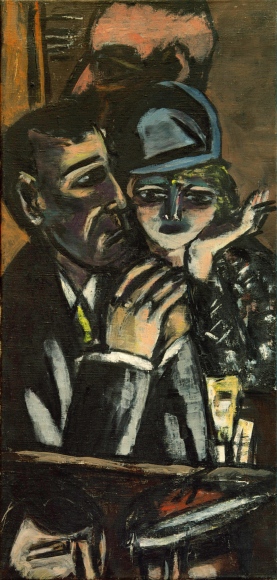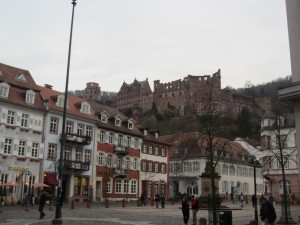The Augsburg prosecutor for the State of Bavaria announced today that in connection with Monday’s agreement with Cornelius Gurlitt, the 1,280 works of art seized from Gurlitt’s apartment in 2012 have been “returned” to Gurlitt. Though it does not appear that the objects have physically changed locations, the state officially lifted the seizure, and now has access to the collection for further provenance research pursuant to the agreement, rather than the compulsory process by which it retrieved them.
The Gurlitt Deal—Prosecutor Gives Collection Back, Agreement Leaves Questions About Process and Transparency
Topics: German Ministry of Culture, Schwabinger Kunstfund, Cornelius Gurlitt, Bundesministerium für Kultur und Medien, Breslau, Augsburg, Willi Korte, London, Max Liebermann, Claude Monet, Christoph Edel, Gurlitt Collection, Ingrid Begreen-Merkel, Alt Ausee, Hildebrandt Gurlitt, stolen art, State of Bavaria, Reiter am Strand, Salzburg, Restitution, David Toren, Müncher Kunstfund, World War II, Task Force, Süddeutsche Zeitung, Freistaat Bayern, NS-beschlagnahmte Kunst, www.lostart.de, Monika Grütters, Riders on the Beach, Raubkunst, Bayerisches Staatsministerium der Justiz, Bavarian Ministry of Justice, Henri Matisse, Paul Rosenberg
The Gurlitt Counteroffensive Continues: Complaint Filed for Return of Paintings
According to multiple news reports and his attorneys, Cornelius Gurlitt has filed a complaint for the return of the paintings seized in 2012 by the Augsburg prosecutor. Copies are not yet available, but the Gurlitt PR website www.Gurlitt.info" has a release that states as follows (thus far only in German). Stay tuned for developments if and when the document becomes available.
Topics: Schwabinger Kunstfund, Complaint, Nazi stolen art, Hannes Hartung, Hildebrand Gurlitt, Gurlitt Info, www.Gurlitt.Info, Augsburg, Germany, Tido Park, Gurlitt Collection, Beschwerde, Entartete Kunst, Gurlitt Facts, Beutekunst, Gurlitt, Restitution, Statute of Limitations, World War II, Derek Setz, degenerate art, Staatsanwalt, Strafprozessordnung (StPO) Paragraph 304, Soviet Union, Raubkunst, Verjährung, Münchner Kunstfund
Augsburg Prosecutor Rejects Idea of Making Deal with Gurlitt, Harvard and LACMA Beckmann Paintings Highlight Difficulty Ahead Without Agreement
Just days after attorneys for Cornelius Gurlitt floated the idea of discussions with survivors and heirs for a possible resolution to the questions about the artworks found in his apartment two years ago that are suspected of having been stolen or sold under duress during the Nazi era (and after the prosecutor was ordered to make a full list available to journalists), the prosecutor in charge of the investigation categorically rejected the possibility of any deal with Gurlitt.
Topics: Erhard Göpel, Frankfurter Allgemeine Zeitung, Stuttgart, Wiesbaden, FAZ, Focus, Hildebrand Gurlitt, Cornelius Gurlitt, Augsburg, Amsterdam, Willi Korte, Schwabinger Kunstfund. Kunstfund München, Marvin Fishman, Reinhard Nemetz, Gurlitt Task Force, Germany, Fall Gurlitt, The Art Newspaper, Gurlitt Collection, Max Beckmann, Karl Buchholz, Robert Looker, Entartete Kunst, Bar Braun, Beutekunst, Schwabing, Magdeburg, LACMA, Ersessene Kunst, Harvard, Gurlitt, Bavaria, Busch-Reisinger, Los Angeles County Museum of Art, degenerate art, the Central Collecting Point, Augsburger Staatsanwalt, www.lostart.de, Nazi art, Sotheby's, Roman Norbert Ketterer, Raubkunst, Verjährung, Mayen Beckmann, National Gallery Berlin, verschollene Kunst, De-Nazification, Selbstbildnis, Self Portrait
Cornelius Gurlitt’s Lawyers File Privacy Complaint
In one of the first affirmative steps taken by Cornelius Gurlitt since the revelation of the seizure of a large number of artworks with possible Nazi-seizure connections, Gurlitt has filed a criminal complaint concerning his allegations of violations of his privacy rights. According to Gurlitt’s attorney, “The surrender of investigative information to the press, and with it the severe damage to his personal rights is not tolerable in any way for Mr. Gurlitt. . . . This is a blatant violation of official secrecy.” Another of his lawyers went on to express concern for trust in the process in which details were being given to the media. In particular, Gurlitt’s team were most upset about photographs in the Focus piece that broke the story of Gurlitt’s apartment.
Topics: Stuttgart, Das Alte Schauspielhaus, Cologne, Irina Alter, veschollene Kunst, Schwabinger Kunstfund, Wiedergutmachung, Annette Weber, Hildebrand Gurlitt, Cornelius Gurlitt, Corinna Budras, S. Lane Faison, Universität Heidelberg, Augsburg, Institute for Jewish Studies Heidelberg, Aryanization, Anat Feinberg, Willi Korte, Schwabinger Kunstfund. Kunstfund München, Monuments Man, Gurlitt Task Force, Germany, Fall Gurlitt, Köln, Nazi-looted art, Henry Keazor, Gurlitt Collection, Appropriated Art the Gurlitt Case, Kurpfälzisches Museum Heidelberg, Hochschule für Judische Studien Heidelberg, Eberhard Karls-Universität Tübingen, Emily Löffler, CSU, Williams College, Judische Allgemeine, Hildebrand Gurlit, Entartete Kunst, Universität Zürich, Arisierung, Lehrstuhl für Römisches Recht und Privatrecht, Nürnberger Institut, Rückgabe, Rhein-Neckar Morgenweb, Beutekunst, 'Stürmer-Bibliothek', Magdeburg, Daniel Krochmalnik, Ersessene Kunst, Katja Terlau, Art Loss Recovery Unit, Jim Tobias, Rhein-Neckar Zeitung, Fritz Backhaus, Gurlitt, Bavaria, Johannes Heil, Wien, Sullivan & Worcester LLP, Lucas Elmenhorst, Kunsthistorisches Institut, Nürnberg, Jüdisches Museum Frankfurt, Looted Art, „Sturmer-Library“, degenerate art, Boston, Seminar für Neuere Geschichte, Wolfgang Ernst, www.lostart.de, Nazi art, Raubkunst, Nicholas M. O'Donnell, Frieder Hepp, Verjährung, Vienna, Münchner Kunstfund, New York, FAZ Frankfurt, Felicitas Heiman-Jellinek
Recap of Ersessene Kunst—Der Fall Gurlitt (Appropriated Art—The Gurlitt Case): January 26, 2014 in Heidelberg
I’ve just returned from my presentation in Heidelberg at the Hochschule für Jüdische Studien in Heidelberg at the conference Ersessene Kunst—Der Fall Gurlitt; Appropriated Art—The Gurlitt Case. The presentations were, without exception, outstanding. They ranged from rarely-told case stories, to sharp insights of some of the overarching principles that guide the the Gurlitt case and similar events. As the discussions made clear, this case will not be easily resolved. That in turn makes recent reports that Cornelius Gurlitt has indicated a willingess to discuss the art's return all the more significant.
Topics: Maria Altmann, Leopold Reidemester, Ministerin für Justiz und Kultur, Stuttgart, Das Alte Schauspielhaus, Cologne, Irina Alter, Portrait of Adele Bloch-Bauer, veschollene Kunst, Focus, Schwabinger Kunstfund, Aschbach Castle, Mussolini, Wiedergutmachung, Annette Weber, Monte Cassino, Cornelius Gurlitt, Corinna Budras, S. Lane Faison, Breslau, Universität Heidelberg, Augsburg, Aryanization, Anat Feinberg, Willi Korte, Schwabinger Kunstfund. Kunstfund München, Monuments Man, Jud Süss, Wrocław, Dresden, Gurlitt Task Force, Germany, Silesia, Fall Gurlitt, Wallraf-Richartz Museum, Köln, Nazi-looted art, Henry Keazor, Gurlitt Collection, Appropriated Art the Gurlitt Case, Schloss Aschbach, Die Welt, Kurpfälzische Museum Heidelberg, Hochschule für Judische Studien Heidelberg, Karl Haberstock, Eberhard Karls-Universität Tübingen, Emily Löffler, CSU, Williams College, Hildebrand Gurlit, Entartete Kunst, Universität Zürich, Arisierung, Lehrstuhl für Römisches Recht und Privatrecht, Württemberg, Schlesien, Nürnberger Institut, Hamburg, Otto Förster, Rückgabe, Beutekunst, 'Stürmer-Bibliothek', Magdeburg, Portrait of Amalie Zuckerkandl, Ersessene Kunst, Katja Terlau, Art Loss Recovery Unit, Jim Tobias, Hermitage, Gurlitt, Bavaria, Johannes Heil, Wien, Sullivan & Worcester LLP, Lucas Elmenhorst, Events, Kunsthistorisches Institut, Nürnberg, Jüdisches Museum Frankfurt, Looted Art, „Sturmer-Library“, degenerate art, Seminar für Neuere Geschichte, Wolfgang Ernst, Justizminister, Göring, www.lostart.de, Nazi art, Raubkunst, Nicholas M. O'Donnell, Frieder Hepp, Verjährung, Vienna, Claudius Krausharr, Münchner Kunstfund, Zwickau, Kajetan Mühlmann, New York, Werner Haftmann, FAZ Frankfurt, Felicitas Heiman-Jellinek
Secret Witness Contradicted Hildebrand Gurlitt’s Claim to Monuments Men that His Art was Burned in Dresden
From Dresden to Aschbach to Düsseldorf—New Scholarship in U.S. Archives Traces Hildebrand Gurlitt at War’s End, Could Affect Cornelius Gurlitt’s Claim to Good Faith Ownership
The Main Post has an article today (in German) by Christine Jeske tracing the late-war and post-war trajectory of Hildebrand Gurlitt and his now-infamous collection. The article is fascinating, and sheds considerable light on how the collection came through the war and how Gurlitt evaded greater scrutiny that might have revealed the trove’s whereabouts earlier. It also puts into context any claim Cornelius Gurlitt might now have to argue he took possession of the paintings from his father unaware of their provenance—what will be a critical argument, particularly if yesterday’s Cultural Property Restitution Law proposal by Bavaria becomes federal law in German.
Topics: Wiesbaden, Cultural Property Restitution Law, veschollene Kunst, Franken, Franconia, Hildebrand Gurlitt, Cornelius Gurlitt, George Clooney, Erik Berger, Augsburg, Dresden, Nuremberg, Fall Gurlitt, Monuments Men, Gurlitt Collection, Karl Haberstock, Kunstverein, Entartete Kunst, Munich, Heiner Dikreiter, Beutekunst, Freiherr Gerhard von Pölnitz, Bavaria, Kulturgut-Rückgewähr-Gesetz, Nürnberg, Düsseldorf, Schlüsselfeld, Monuments Fine Arts and Archives, Gemäldegalerie Dresden, Christine Jeske, Walter Paech, degenerate art, Städtische Galerie, München, Main Post, Karl and Magdalene Haberstock Foundation, Raubkunst, Verjährung, Nazi Raubkunst, Aschbach
Bavaria to Review Draft Revision to Statute of Limitations on Claims to Art Found in Gurlitt Apartment
Die Welt reports today that a scheduled cabinet meeting of the government of Bavaria includes discussion of a draft revision to the state’s statute of limitations. Justice Minister Winfried Bausback (CSU) has apparently stated his desire to ensure that claimants like those heirs to owners of works found in Cornelius Gurlitt’s apartment will not be barred by the statute of limitations, following through on statements he made last year after being selected. There has been lively discussion of whether such claims would be time barred, but this revision would presumably be intended to answer the question broadly. It could signal the beginning of legislative steps to address the situation. The previous Justice and Culture Minister Beate Merk had come under heavy criticism, but a new minister may have room to make some changes. And, in a parliamentary system, the consensus of the ruling government is more significant in anticipating the passage of legislation.
Topics: Ministerin für Justiz und Kultur, Legal Tribune, veschollene Kunst, Beate Merk, Cornelius Gurlitt, Augsburg, Schwabinger Kunstfund. Kunstfund München, Gurlitt Task Force, Germany, Fall Gurlitt, Gurlitt Collection, Die Welt, Lorenz Kähler, CSU, Hildebrand Gurlit, Entartete Kunst, Ingeborg Berggreen-Merkel, Beutekunst, Magdeburg, Gurlitt, Bavaria, degenerate art, Freistaat Bayern, Justizminister, www.lostart.de, Nazi art, Raubkunst, Verjährung, Winfried Bausback




